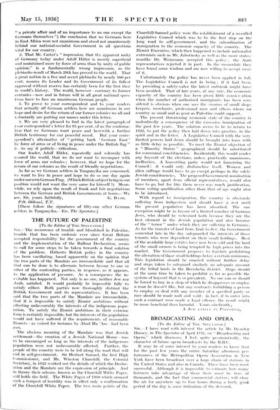THE FUTURE OF PALESTINE [To the Editor of Tim SPECTATOR.]
SIR,—The recurrence of trouble and bloodshed in Palestine, trouble that has been endemic ever since Great Britain accepted responsibility for the government of the country and the implementation of the Balfour Declaration, seems to call for some steps to be taken towards a final solution of the problem. Hitherto British policy in the country has been vacillating, based apparently on the opinion that the two parts of the Mandate are irreconcilable and that all that can be done is to alternate between favour to one or other of the contending parties, in response, as it appears, to the application of pressure. As a consequence the in- evitable has happened. Not only is no one, neither Jew nor Arab, satisfied. It would probably be impossible fully to satisfy either. Both parties now thoroughly distrust the British Government and its representatives. It has been said that the two parts of the Mandate are irreconcilable, that it is impossible to satisfy Zionist ambitions without affecting unfavourably the interests of the indigenous popu- lation. To satisfy the Zionist ambitions in their extreme form is certainly impossible, but the interests of the population would not have suffered if the requirements of reasonable Zionists—as voiced for instance by Ahad Ha 'Am —had been met.
The obvious meaning of the Mandate was that Jewish settlement—the creation of a Jewish National Home—was to be encouraged so long as the interests of the indigenous population were not unfavourably affected. Further, the people of the country were to be led along the road that will end in self-government. Sir Herbert Samuel, the first High Commissioner, and Mr. Winston Churchill, the Colonial Secretary, in 1922 worked out the details of which the Declar- ation and the Mandate are the expression of principle. And in theory their scheme, known as the Churchill White Paper, still holds the field. The White Paper of 1930 which aroused such a tempest of hostility was in effect only a reaffirmation of the Churchill White Paper. The two main points of the
Churchill-Samuel policy were the establishment of a so-called Legislative Council which was to be the first step on the long road to self-government, and the subordination of immigration to the economic capacity of the country. The Zionist Executive, which then happened to include nationalist extremists such as Mr. JabOttnaky as well as the more states- manlike Dr. Weinuann. accepted this policy ; the Arab representatives rejected it in part. In the meanwhile they have found some wisdom and arc now willing to accept more of it.
Unfortunately the policy has never been applied in full. The Legislative Council is not in being : if it had been, by providing a safety-valve the latest outbreak might have been avoided. That of late years, at any rate, the economic capacity of the country has been given little consiiclition when the number of authorised immigrants has been con- sidered is obvious when one sees the swarms of small shop- keepers, merchants, professional men and others whom no country as small and as poor as Palestine could support.
The present threatening economic state of the country is undoubtedly a consequence of the excessive immigration of the past few years. The solution seems to be to return to 7922, to put the policy then laid down into practice. in the spirit and in the letter. A Legislative Council with the very limited powers laid down should be brought into force with as little delay as possible. To meet the Zionist objection of a "Minority Status " geographical should be substituted for communal constituencies. Incidentally this would render any boycott of the elections, unless practically unanimous,
s, ineffective. A boycotting party would not hamstring the Council : it would only disfranchise itself. Women and alien suffrage would have to go except perhaps in the solely Jewish constituencies. The proposed Government nomination of members, apart from official representatives, would also have to go, but for this there never was much justification. Some voting qualification other than that of age ought also to be introduced.
With regard to immigration, the country is obviously suffering from indigestion and should have a rest until the present population has been absorbed. The one exception might be in favour of a limited number of German Jews, who should be welcomed both because they are the best element in the Jewish population and also because of the " terror " under which they are suffering in Germany. As for the transfer of land from Arab to Jew. the Government somewhat late in the day safeguarded the interests of those tenants who were dependent on their 'small holdings. Most of the available large estates have now been sold and the land of the small owners is being tempted by high prices into the market. The Government proposes to legislate prohibiting the alienation of these small holdings below as certain minimum. This legislation should be enacted without further delay and steps taken to safeguard similarly an adequate amount of the tribal lands in the Beersheba district. Steps should at the same time be taken to prohibit as far as possible the system of boycott that is so prevalent. No one can or should be forced to buy in a shop of which he disapproves or emplo■ a man he doesn't like, but any contracts forbidding a person to employ or deal with any member of a specified party or race should be made null and void : in fact, if to enter into such a contract were made a legal offence. the result might be more beneficial than harmful. - Your obediently, A JEW I.A TEI X Ix 11.% LESTI N






















































 Previous page
Previous page